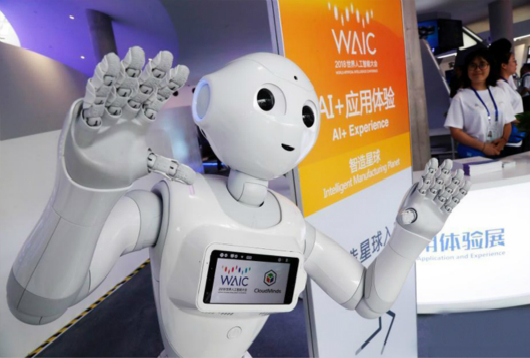
. > TOP STORIES
Experts explore China’s economic transition
Author : Zhao Sanle Source : Chinese Social Sciences Today 2019-03-21

The World Artificial Intelligence Conference 2018 took place in Shanghai last September, drawing the world’s leading AI scientists and entrepreneurs for discussions on AI’s latest technological frontiers and industrial applications. Photo: Tang Yanjun/CHINANEWS.COM
To strengthen the innovation capacity and competitiveness of China’s economy, a modernized economy is essential. At this year’s two sessions, a consensus has emerged—China needs to adhere to high-quality development to further boost its economy. As China upgrades its economy to high-quality development and makes itself a country of innovators, how will the world interpret China’s economic transition?
Michael R. Powers, Zurich Group professor of risk mathematics at Tsinghua University’s School of Economics and Management, said that although countries like the US and the UK have experienced economic transitions, China is unique in that it is the world’s fastest-growing major economy. China also has a different model of economic growth in which the government provides strong guidance. For example, upgrading economic growth causes decline in the employment rate. The American government used to let the employment rate plummet, whereas the Chinese government will take effective measures to relieve the impact. According to Powers, China’s model combines macroeconomic regulation with a market economy to facilitate economic growth, hence China’s economic miracle.
Powers acknowledged some challenges facing China. For example, some countries are concerned that the rise of China may increase competition over available resources. Some Western countries are hostile to any model of economic growth that is different from theirs, making China a victim of negative bias.
The international community needs to realize that, regardless of economic model, common development is what needs to be addressed, Powers noted, adding that China needs to use such multilateral platforms as the WTO more effectively to communicate with the world, so that the international community can have a deeper understanding of China’s intention. Certain Western countries should not hold biased views, and China needs not to see its model of economic growth or economic system as inferior to that of other countries.
Iris Pang, Greater China economist at ING Wholesale Banking, said that China’s transition to high-quality development is inevitable. With China’s products improving in quality, technological content and intrinsic value, China’s economy has huge potential. Pang said that the implementation of supply-side structural reform also makes China’s enterprises more confident and more visible to the world.
One of the important measures in China’s transition to high-quality growth is to inspire and protect entrepreneurship. According to Powers, this measure makes China’s economic outlook even more promising.
On China’s effort of building a modernized economy, Powers suggested that China should invest more in other countries and carry out joint projects with other countries involved in the Belt and Road (B&R) initiative. Pang also said that the B&R initiative facilitates China’s economic transition by bringing numerous business opportunities to China.
Pang said that some fields of the Chinese economy, such as the e-commerce industry, have become incomparable internationally, yet China’s rise is not welcomed in some Western countries. To lower tensions, Pang suggested that China should engage in constructive dialogues with the world and work on improving its global image. Also, China can seek to make itself more attractive to foreign investors by taking encouraging measures, such as easing market access.
China sees innovation in science as the primary driving force for development and as the strategic underpinning for building a modernized economy. China’s advancement in science attracts global talent to come study. Kamran Amin was one such student. The Pakistani scientist now works at China’s National Center for Nanoscience and Technology. Kamran said that, during his three-year study in China, he witnessed the number of startups and research institutions soaring and China’s society progressing dramatically.
Pivotal for scientific development, basic research will help China stand at the forefront of science and technology. The government work report this year calls for strengthening basic research and applied research, making major breakthroughs in groundbreaking original innovations, and developing core technologies.
Kamran recognized the importance of basic research and said that the Chinese government used to mainly support applied research, but now it is directing much more funds to basic research and setting up relevant scholarships. Kamran expected to see China’s achievements in such high-end technologies as AI and big data benefit all sectors of society.
A green and low-carbon economy is characteristic of a modernized economy. Lim Tai Wei, an adjunct research fellow at National University of Singapore (NUS) East Asian Institute, said that China’s green growth benefits not only itself but also the world. China can thus be less reliant on traditional energy products and use new energy more. Furthermore, China’s green growth promotes cooperation with neighboring countries on non-traditional security issues, such as global warming. China sets an example for others by working toward a green economy, thereby building its soft power.
Ye Shengtao made Chinese fairy tales from a wilderness
Ye Shengtao (1894–1988) created the first collection of fairy tales in the history of Chinese children’s literature...
-
How northern ethnicities integrated into Chinese nation
2023-09-18
-
Mogao caves
2023-09-12
-
Mogao Grottoes as ‘a place of pilgrimage’
2023-09-12
-
Time-honored architectural traditions in China
2023-08-29
-
Disentangling the civilizational evolution of China
2023-08-28
-
AI ethics in science fiction
2023-08-23













 2011-2013 by www.cssn.cn. All Rights Reserved
2011-2013 by www.cssn.cn. All Rights Reserved